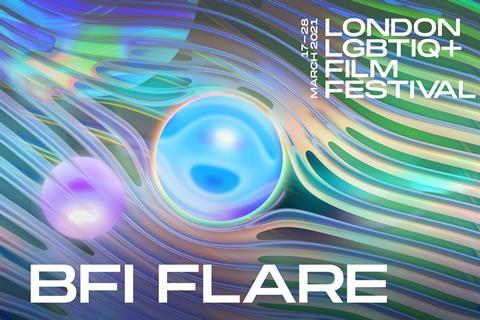I’ve been challenged recently by my partner’s decision to stop watching films where straight people play queer characters. It is a stand that I feel uncomfortable with taking, but I can understand the reasons for arriving at it. I genuinely feel the need to contribute support to queer film as the situation of regular production of films with queer themes or story lines feels so precarious that any box office failure might destroy the potential production of countless upcoming titles. However, beneath this conversation happening in the ‘mainstream’ there is a regular production of queer non-conforming films challenging heteronormativity where the straight white cis-male voice isn’t naturalised or assumed. The distribution of these films is more complex making them less accessible, which is where BFI Flare comes in. The festival makes it possible to engage with this non-hegemonic cinema. It’s a special opportunity to see my LGBTIQ+ community reflected on the silver screen that I don’t take for granted.
From the shorts I just wanted to highlight ‘The Night Train (Nattåget)‘ which was a Swedish meet cute told in the most sensual camerawork, intently capturing the power of the ‘love-at-first-site’ gaze. A more unfamiliar concept was explored in ‘Listening In (HaMaazin)‘ which featured a solider spying on a Palestinian gay couple. Both films demanded nuanced performers from their young leads and I found both to be incredibly affecting. Lastly, I also would like to shout out ‘Is It Me‘ for being a documentary short with some unforgettable imagery – an example of aesthetics that really ground the ideological questions of the film and the subject.
I found conventional storytelling in some of the features: Cowboys, Firebird, Dramarama, Boy Meets Boy, & Jump Darling all found their skeletons in the genres of coming of age and romance, – but each contained meaningful contributions to challenge the conventional gaze and language of cinema. I particularly found Dramarama effective for challenging the usual coming out narrative, subverting expectations with an absorbing third act. I should acknowledge my bias for this film, as it appears aspects were lifted directly from my life. There was nothing conventional about Enfant Terrible, which was a bold theatrical re-visioning of the biopic. Fassbinder is someone I’ve admired through his films, but this was a challenging expose of the way in the high status of male auteurs is often assumed without question. There is cross over here with the position of the straight white male, but it is the unapologetic gayness of the Fassbinder’s world that disrupts this conventional narrative.
The historical perspective of documentaries Rebel Dykes and Cured were very valuable insights into new areas of queer history for me. A more provocative watch was I Am Samuel, capturing the relationship of a gay Kenyan couple. Captured over five years in an observational style, the men navigate the complexities of their identity in both rural Kenya and the comparative urban freedom of Nairobi. It is a portrayal that manages to lay bare the difficulties of the context, but also has a heartwarming side to it as the relationship at the heart of the film comes across as pure and loving as anything I’ve seen in recent cinema.
The last two films I wanted to draw attention to were Rurangi and Colours of Tobi. Their challenge to the cisnormative portrayals of trans* identities was applauded by this piece by Thomas Flew. The article finishes by stating: “The films are here, and trans and gender non-conforming audiences are already watching and loving them. It’s time for cis audiences to start watching too.” It makes an important case for why films need to be made by the people they are about. These are authentic stories that deserve wide and diverse audiences. The Flare Festival is such an important space to provide starting points for these products, but the structure of the industry must find ways to help these diverse products progress from the periphery and find meaningful engagement with mainstream audiences. In a perfect world this might help prevent films like The Danish Girl and Dallas Buyers Club perpetuating problematic dominant narratives. In Flew’s words: “Until mainstream cinema can portray trans characters without obsessing over their genitals, the multiplex won’t be a safe or welcoming place for trans audiences.”

